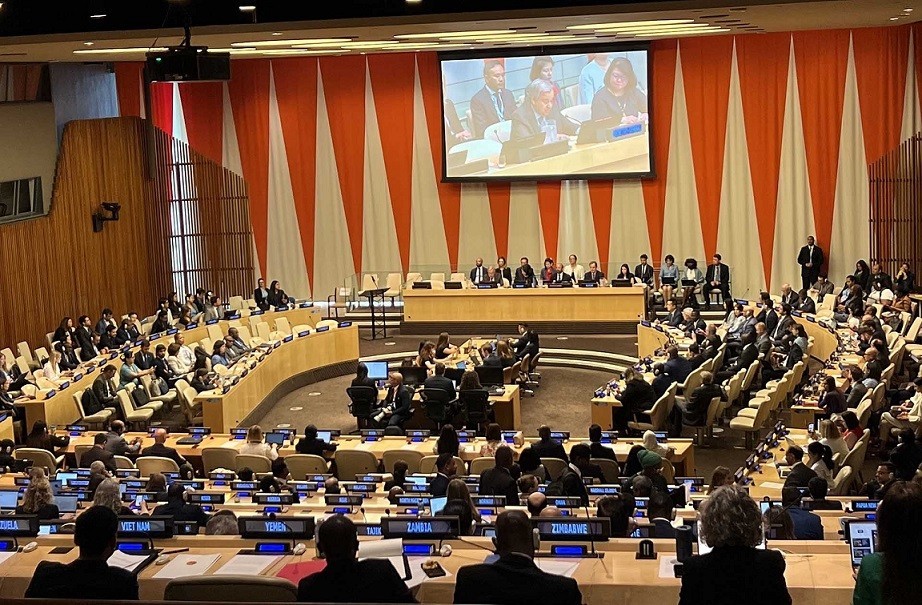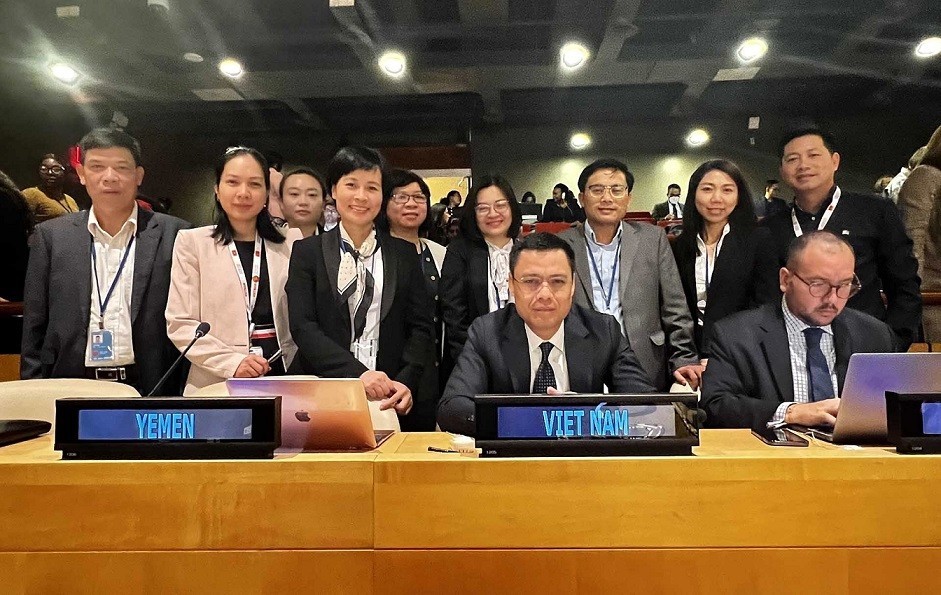
BBNJ Agreement - a new step in international law and future prospects (Part II)*
Latest
 |
| On June 19, 2023, the Inter-Governmental Conference agreed to approve the Agreement under the United Nations Convention on the Law of the Sea 1982 (UNCLOS 1982) on the Conservation and Sustainable Use of Marine Biological Diversity of Areas beyond National Jurisdiction (BBNJ Agreement). (Photo: Vietnam Permanent Mission in New York) |
Historical milestone
Similar to the two previous implementing agreements under UNCLOS 1982 (the 1994 Agreement on Implementing Part XI UNCLOS 1982 and United Nations Fish Stocks Agreement 1995), BBNJ is the continuation and clarity of UNCLOS 1982, which is considered “Constitution of the seas and oceans" and the most important legal framework regulating all activities related to the sea.
The completion on negotiation process and the signing of the BBNJ Agreement is considered a great victory of multilateral diplomatic efforts, marking a step forward, a historical milestone, opening up new momentum for international cooperation.
United Nations Secretary General Antonio Guterres emphasized that the negotiation process and adoption of BBNJ demonstrates the power of multilateralism, built on the spirit of the 1982 UNCLOS Convention, demonstrating commitment to resolving global challenges, and ensure sustainability in areas beyond national jurisdiction.
Ambassador Dang Hoang Giang, Permanent Representative of Vietnam to the United Nation assessed that the BBNJ Agreement further strengthens UNCLOS 1982 and is a new milestone in the development of international law and contributes to the implementation of the Decade of United Nation on marine science that serves sustainable development and many other sustainable development goals.
Result after 20 years of negotiations, discussion has demonstrated collective efforts. The parties have narrowed the differences to be able to cope with many common global challenges today.
Up to now, there are 82 member countries and European Union (EU) have signed the Agreement, once again demonstrated the international community's positive reception and support for BBNJ Agreement.
Opening new opportunities for cooperation
In addition, as the third Implementation Agreement under the UNCLOS’s framework, BBNJ has additional role and continues to contribute to the effective implementation of UNCLOS 1982 in promoting effective ocean governance, sustainably conservating and using marine resources and biodiversity beyond national jurisdiction.
 |
| Ambassador Dang Hoang Giang, Permanent Representative of Vietnam to the United Nation and Vietnam's delegation at the UN session on BBNJ. (Photo: Vietnam Permanent Mission in New York) |
BBNJ is hoped to open new opportunities for international cooperation in new areas requiring high capability in science and technology such as sea genes, regional management tools, marine environmental impact assessment, and construction on capacity building and marine technology transfer.
A noteworthy point in BBNJ is that the Agreement provides many provisions related to developing, underdeveloped countries or countries do not have geographical advantages; including mechanisms related to capacity building and technology transfer from developed countries to developing countries.
As an oceanic country, Vietnam is proactively participating in the BBNJ negotiation process since the beginning, offering pratical recommendations and contributions. Vietnam is also one of the first members to sign BBNJ in the beginning when Agreement was opened for signing.
It not only reflects the spirit of “responsible member in the international community” but also proves that the multilateral diplomatic paths of Vietnam in “proactively building, shaping the common law”, thereby contributing to build and enhance the legal order on the sea, ensuring the suistanable development for countries and future generations.
| “Vietnam hope ‘to become the strong maritime nation, with suistainable development, prosperity, safety, etc. participating proactively and responsibly in solving international and regional issues of sea and ocean”, according to the Strategy for the sustainable development of Vietnam’s marine economy to 2030 and vision to 2045. In a an interview about the BBNJ Agreement, Ambassador Dang Hoang Giang stated: “With proper guidelines and policies of our Party and State on the sea as well as on international integration, with the motto "Proactively and actively integrating deeply and widely", "to be a friend, a reliable partner, a responsible member of the international community", we will participate more and more in activities in the ocean beyond national jurisdiction, within Southeast Asia, as well as other regions of the world. |









